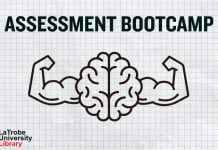We’ve answered a few commonly asked questions you may have on how online assessments work.
1. What does the online assessment process look like?
In most cases, access to the online assessment will require you to login through the LMS portal for the subject at the time the assessment is scheduled, or at the time it is released in the case of assessments with longer release windows.
However, for some subjects, there may be further requirements for specific tasks, and you should definitely check the subject information carefully well ahead of the scheduled assessment.
2. How many different types of online assessments are there and how do they work?
There are two different types of online assessment tasks:
- Assessments with a set time to complete – these tasks have a specific beginning and end time (for example, 30 minutes to complete the questions).
- Assessments with a window of time to complete – these tasks can be completed any time throughout a longer window (for example, a day or 48 hours or longer, and students will need to organise their own time during that window).
The full details of your assessment task will be available in each subject’s page on the LMS soon. There you will find specific instructions from your subject coordinator and an indication of how long the task should take to complete.
3. How much time do I have to complete each assessment?
As with any form of assessment, the time will vary, tailored to the nature of the task, its weighting and the learning objectives of the subject. Check subject information carefully well ahead of the scheduled assessment and note the exact period of time available for completion of each assessment and when this is scheduled. Add these into your phone calendar and set reminder alarms.
4. Will all assessments be open-book?
This, too, will vary among subjects. Some online assessments will be open book (as is typically the case, for example, with take home exams). However, in a few cases there may be expectations that students will not consult additional resources during completion of the assessment. This will be made clear in the assessment information on subject LMS sites.
5. How is it policed?
It is important to note that the same expectations of Academic Integrity apply to all assessments, no matter their format. While the exact methods for how assessment requirements are policed may vary, all students are bound by the common requirements of academic honesty.
6. Where can I find all the information for each assessment?
Full assessment details for each subject are available on the subject LMS site.
7. What do I do if my internet connection is poor?
If you’re not confident your internet connection is reliable enough to get you through assessments, extra support is available – see extra support during the exam period.
If you do have issues during your assessment, you might be able to apply for special consideration. For more information see our article What to do when you have technical issues during online assessments.
8. If I’m having an issue during the assessment, who do I contact?
This depends on the nature of the issue. If you are having difficulty understanding what the assessment task requires of you, you should contact your teacher or subject coordinator by email (or by another contact method if the teacher/subject coordinator has indicated one prior to the commencement of the assessment).
If you become unwell, the normal process of Special Consideration applies.
If you are experiencing unexpected technical issues, please contact IT support immediately.
9. Can my parents or housemates help me if they’re also in the living room?
No. Absolutely not. The same expectations of academic integrity that apply to all assessment types, also apply to online assessments. This means collusion is strictly forbidden and all submitted work must be the student’s own.
10. If I’m feeling really lost in my studies prior to the assessment, where can I go for help?
Reach out to your lecturers, tutors/demonstrators and/or subject coordinators for assistance with content – they all want you to succeed. There’s also plenty of online support available from the Learning Learning Services team, including help on science, maths, coding, study planning, time management, structuring essays and much more.















